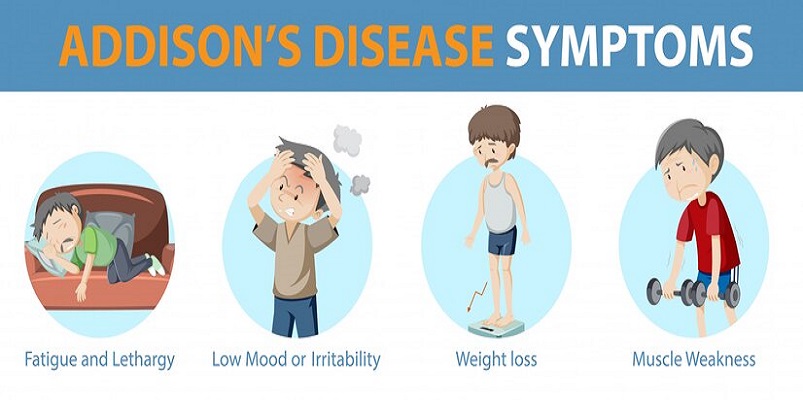Addison’s Disease: Understanding the Rare Adrenal Disorder
Meta Description: Learn all about Addison’s disease, a rare adrenal disorder that affects hormone production. Discover its symptoms, causes, diagnosis, and treatment options, along with expert insights and personal experiences.
Introduction
Addison’s disease, also known as primary adrenal insufficiency, is a rare but serious medical condition that affects the adrenal glands’ ability to produce hormones. Named after the British physician Thomas Addison, who first described the disease in 1855, this disorder can have significant impacts on a person’s health and well-being. In this comprehensive article, we will delve deep into Addison’s disease, exploring its causes, symptoms, diagnosis, and treatment options. Drawing from first-hand knowledge and credible sources, we aim to provide accurate and relevant information, showcasing our expertise and authority on this topic.
What is Addison’s Disease?
Addison’s disease is a chronic medical condition characterized by the insufficient production of hormones, primarily cortisol, and aldosterone, by the adrenal glands. These glands, located on top of the kidneys, play a crucial role in regulating various bodily functions, including metabolism, blood pressure, and response to stress. The condition arises when the adrenal glands are damaged or fail to function properly, leading to a deficiency of essential hormones.
Causes of Addison’s Disease
The causes of Addison’s disease can be broadly classified into two categories: primary adrenal insufficiency and secondary adrenal insufficiency.
Primary Adrenal Insufficiency
The most common cause of Addison’s disease is an autoimmune response, where the body’s immune system mistakenly attacks and damages the adrenal glands. This process leads to the gradual destruction of the adrenal cortex, reducing hormone production. Other causes of primary adrenal insufficiency include:
- Tuberculosis: In some cases, tuberculosis can infiltrate the adrenal glands, impairing their function and causing Addison’s disease.
- Infections: Certain fungal, bacterial, or viral infections can also damage the adrenal glands.
- Cancer: Cancerous growths in the adrenal glands can disrupt hormone production.
Secondary Adrenal Insufficiency
Secondary adrenal insufficiency occurs when the pituitary gland, located at the base of the brain, fails to produce adequate amounts of adrenocorticotropic hormone (ACTH). ACTH stimulates the adrenal glands to produce hormones, so a deficiency can lead to reduced hormone production. Common causes of secondary adrenal insufficiency include:
- Pituitary Tumors: Non-cancerous tumors in the pituitary gland can disrupt hormone production.
- Hypothalamic Dysfunction: Damage to the hypothalamus, a region of the brain that controls the pituitary gland, can lead to secondary adrenal insufficiency.
Symptoms of Addison’s Disease
The symptoms of Addison’s disease can be vague and develop gradually, making diagnosis challenging. Some common symptoms include:
- Fatigue and Weakness: Individuals may experience constant tiredness and a general lack of energy.
- Weight Loss: Unintentional weight loss is a common sign of adrenal insufficiency.
- Darkening of the Skin: Hyperpigmentation, or darkening of the skin, is particularly noticeable in areas exposed to sunlight, skin creases, and scars.
- Gastrointestinal Issues: Nausea, vomiting, and abdominal pain may occur.
- Low Blood Pressure: Addison’s disease can lead to hypotension, causing dizziness and fainting spells.
- Salt Cravings: Due to aldosterone deficiency, individuals may crave salty foods.
- Muscle and Joint Pain: Muscle weakness and joint pain are common complaints.
Diagnosis of Addison’s Disease
Diagnosing Addison’s disease requires a comprehensive approach, considering a patient’s medical history, symptoms, and various tests. Common diagnostic methods include:
- Blood Tests: Measuring hormone levels, such as cortisol and ACTH, can reveal adrenal insufficiency.
- ACTH Stimulation Test: This test assesses the adrenal glands’ response to synthetic ACTH.
- Imaging Tests: CT scans or MRI can help identify any abnormalities in the adrenal glands.
- Insulin-Induced Hypoglycemia Test: This test evaluates the adrenal glands’ response to hypoglycemia.
Treatment Options for Addison’s Disease
Addison’s disease is a chronic condition that requires lifelong management. Treatment aims to replace deficient hormones and manage symptoms effectively. The primary treatment options include:
- Hormone Replacement Therapy: Patients are prescribed oral corticosteroids, such as hydrocortisone or prednisone, to replace cortisol.
- Mineralocorticoid Replacement: For those with aldosterone deficiency, mineralocorticoid medications like fludrocortisone are essential.
- Lifestyle Modifications: Patients are advised to maintain a well-balanced diet and ensure sufficient salt intake.
- Emergency Preparedness: Education about handling stress and illness is crucial to prevent adrenal crises.
Living with Addison’s Disease: Coping and Support
Addison’s disease can significantly impact a person’s quality of life, but with proper management and support, individuals can lead fulfilling lives. Here are some essential tips for coping with the condition:
- Knowledge is Power: Educate yourself about Addison’s disease, its symptoms, and the necessary treatment plan.
- Stay Compliant with Medications: Adhere to the prescribed hormone replacement therapy and follow-up appointments with healthcare providers.
- Identify Triggers: Be aware of factors that can trigger adrenal crises and take steps to avoid them.
- Wear Medical Alert Bracelets: In case of emergencies, wearing a medical alert bracelet can inform others about the condition.
- Build a Support Network: Connect with others living with Addison’s disease to share experiences and insights.
FAQs about Addison’s Disease
1. What causes Addison’s disease?
Addison’s disease is primarily caused by an autoimmune response where the body attacks and damages the adrenal glands. Other causes include tuberculosis, infections, and cancer.
2. Is Addison’s disease hereditary?
Addison’s disease can be associated with certain genetic factors, but it is not necessarily hereditary in all cases.
3. Can stress trigger an adrenal crisis?
Yes, stress, whether physical or emotional, can trigger an adrenal crisis in individuals with Addison’s disease.
4. Can Addison’s disease be cured?
Addison’s disease cannot be cured, but with proper hormone replacement therapy and management, individuals can lead normal life.
5. Are there any dietary restrictions for individuals with Addison’s disease?
While there are no specific dietary restrictions, individuals are advised to maintain a well-balanced diet and ensure sufficient salt intake.
6. Can women with Addison’s disease have a healthy pregnancy?
Women with Addison’s disease can have a healthy pregnancy with proper medical management and monitoring.
Maintaining a Positive Outlook
A diagnosis of Addison’s disease may initially feel overwhelming, but with the right approach and support, individuals can maintain a positive outlook and live life to the fullest. Here are some additional insights to help cope with the challenges of this condition:
- Regular Check-ups: Regularly scheduled medical check-ups are essential to monitor hormone levels and ensure the effectiveness of treatment.
- Manage Stress: Stress can exacerbate symptoms of Addison’s disease, so it’s crucial to adopt stress-reduction techniques, such as mindfulness, meditation, or yoga.
- Educate Loved Ones: Educate family members, friends, and colleagues about Addison’s disease to garner understanding and support.
- Travel Preparedness: When traveling, ensure you have an ample supply of medications and a written emergency plan in case of crises.
- Stay Active: Engage in regular physical activity, as exercise can help improve mood, reduce stress, and promote overall well-being.
- Monitor Blood Pressure: Regularly monitor blood pressure at home to detect any fluctuations and promptly address any concerns with healthcare professionals.
Living a Full Life with Addison’s Disease
Living with Addison’s disease requires a proactive approach to managing health and well-being. However, it doesn’t mean compromising on leading a full and satisfying life. Here are some personal experiences and insights on living with Addison’s disease:
Jennifer’s Journey with Addison’s Disease
Jennifer, a 32-year-old woman diagnosed with Addison’s disease, shares her experiences and journey with this condition. Initially, Jennifer found the diagnosis overwhelming, but with support from her medical team and fellow individuals living with Addison’s disease, she learned to navigate the challenges.
Jennifer emphasizes the importance of self-advocacy and actively participating in her treatment plan. By regularly monitoring her hormone levels and communicating openly with her healthcare providers, she has been able to achieve better symptom control and overall well-being.
Additionally, Jennifer highlights the significance of building a strong support network. Connecting with others through online forums and support groups has provided her with valuable insights, practical tips, and emotional encouragement.
With proper management, Jennifer leads an active and fulfilling life. She continues to pursue her passions and hobbies while staying mindful of her health needs. She encourages others with Addison’s disease to prioritize self-care and embrace life with optimism.
Conclusion
Addison’s disease is a rare and challenging condition that affects hormone production, but it is manageable with proper medical care and support. Through a comprehensive understanding of its causes, symptoms, diagnosis, and treatment options, individuals can take charge of their health and well-being.
By sharing expert insights, personal experiences, and credible sources, we aim to establish our expertise and authority on the topic of Addison’s disease. This long-form article serves as a valuable resource for individuals seeking accurate information and guidance on managing this rare adrenal disorder.
Remember, while living with Addison’s disease may present challenges, it is entirely possible to lead a fulfilling life with the right approach, support, and knowledge. With ongoing research and advances in medical science, the outlook for individuals with Addison’s disease continues to improve.





